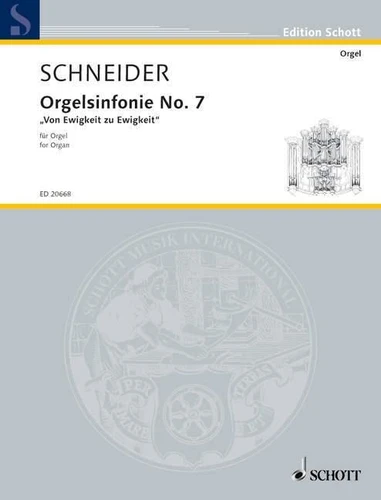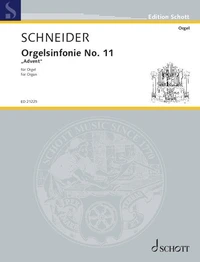Edition Schott
Symphonie pour orgue n° 7. "Von Ewigkeit zu Ewigkeit". organ.
Par : Formats :
- Paiement en ligne :
- Livraison à domicile ou en point Mondial Relay estimée à partir du 5 décembreCet article sera commandé chez un fournisseur et vous sera envoyé 10 jours après la date de votre commande.
- Retrait Click and Collect en magasin gratuit
- Livraison à domicile ou en point Mondial Relay estimée à partir du 5 décembre
- Réservation en ligne avec paiement en magasin :
- Indisponible pour réserver et payer en magasin
- Nombre de pages52
- Poids0.211 kg
- Dimensions23,1 cm × 30,3 cm × 0,0 cm
- ISBN979-0-001-16880-9
- EAN9790001168809
- Date de parution01/01/2010
- CollectionORGUE
- ÉditeurSchott
Résumé
Each organ symphony by Enjott Schneider has its own colour and its own theme. Organ Symphony No. 7 'Von Ewigkeit zu Ewigkeit' is dominated by the theme of 'time' : from the flowing rumbling of time in ancient beginnings ('In principio' - 1st movement) and periodic to the intellectually incomprehensible revolving ('Zeit der Sterne' - 2nd movement). After the third movement ('Zeit des Menschen'), a valse triste, infused by an almost humorous hectic atmosphere, the symphony ends with a kind of 'Amen ! ' in the fourth movement.
Schneider sums it up : 'It is good as it is, we do not understand the course of time anyway. ' With regard to style, his composition is based on elements of minimal music which he combines with the tradition of the European organ composition ; it is at the same time a testimony to the composer's flexibility and versatility. Instrumentation : organ
Schneider sums it up : 'It is good as it is, we do not understand the course of time anyway. ' With regard to style, his composition is based on elements of minimal music which he combines with the tradition of the European organ composition ; it is at the same time a testimony to the composer's flexibility and versatility. Instrumentation : organ
Each organ symphony by Enjott Schneider has its own colour and its own theme. Organ Symphony No. 7 'Von Ewigkeit zu Ewigkeit' is dominated by the theme of 'time' : from the flowing rumbling of time in ancient beginnings ('In principio' - 1st movement) and periodic to the intellectually incomprehensible revolving ('Zeit der Sterne' - 2nd movement). After the third movement ('Zeit des Menschen'), a valse triste, infused by an almost humorous hectic atmosphere, the symphony ends with a kind of 'Amen ! ' in the fourth movement.
Schneider sums it up : 'It is good as it is, we do not understand the course of time anyway. ' With regard to style, his composition is based on elements of minimal music which he combines with the tradition of the European organ composition ; it is at the same time a testimony to the composer's flexibility and versatility. Instrumentation : organ
Schneider sums it up : 'It is good as it is, we do not understand the course of time anyway. ' With regard to style, his composition is based on elements of minimal music which he combines with the tradition of the European organ composition ; it is at the same time a testimony to the composer's flexibility and versatility. Instrumentation : organ




















